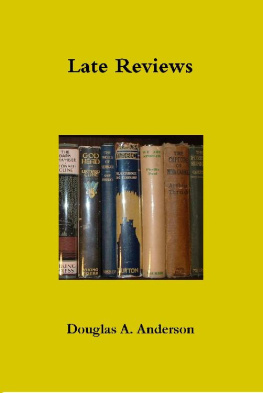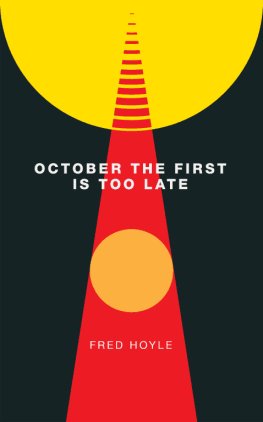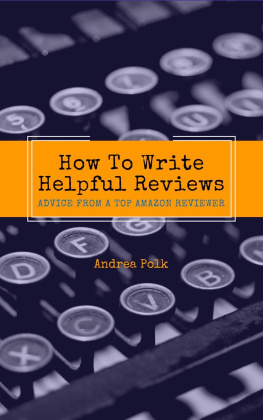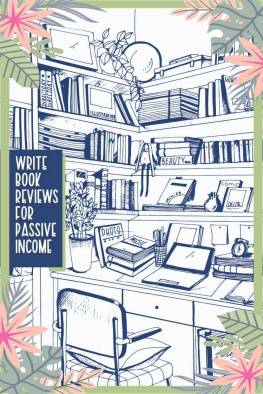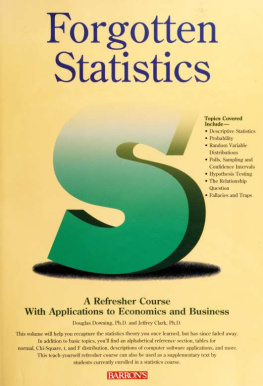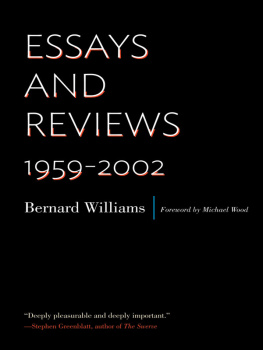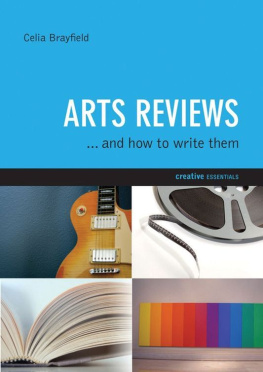Late Reviews
Also by Douglas A. Anderson
Prefaces Without Books (forthcoming)
Edited by Douglas A. Anderson
A Background Reader to Tolkien On Fairy-stories
Late Reviews
Douglas A. Anderson
Nodens Books
2018
Late Reviews
First published by Nodens Books, 2018
This edition copyright Nodens Books, L.L.C.
ISBN 9781987512564
Printed in the United States of America
First edition: April 2018
Nodens Books www.nodensbooks.com
PO Box 493
Marcellus, MI 49067
All contents copyright 2018 by Douglas A. Anderson.
All rights reserved, including the right to reproduce this book, or portions thereof, in any form, by any means, without written permission of the publisher, except where permitted by law.
Introductory Note
Late Reviews are reviews that were not composed contemporaneously with a books original writing or publication. This volume collects such reviews as I have writtencovering books from the late nineteenth-century onwardsfor my Late Reviews column in the first thirty issues of Wormwood: A Journal Dedicated to Writings about Fantasy, Supernatural and Decadent Literature , edited by Mark Valentine and published by Tartarus Press, from Autumn 2003 to Spring 2018. I have also included my Late Reviews from other sources, going back to some that appeared in the mid-1990s, and I have added a number of previously unpublished ones written specifically for this collection. A good number have been silently revised, when I have learned additional details (usually about the author) since the original review appeared.
For help in various waysfrom the loan of books to many other kindnessesI am grateful to Russ Bernard, Deidre Dawson, Michael Dirda, Kevin Dodd, James Doig, Dimitra Fimi, Robert Knowlton, John D. Rateliff, Xavier Legrand-Ferronnire, John Pelan, Jim Rockhill, Mark Samuels Lasner, and Boyd White. For allowing me to have this lengthy presence in Wormwood I thank editor Mark Valentine and publisher R.B. Russell.
Douglas A. Anderson
Late Reviews
A
Adcock, A. St. John. The World That Never Was: A London Fantasy (London: Francis Griffiths, 1908). Illustrated by Tom Browne.
Arthur St. John Adcock (1864-1930) was a literary gadfly of the early twentieth century, for many years the editor of The Bookman , and an acquaintance to a large number of literary writers, including Arthur Machen and William Hope Hodgson. He is remembered today chiefly for his two volumes of impressions of contemporary authors, Gods of Modern Grub Street (1923) and The Glory That Was Grub Street (1928), but one of his more enduring volumes should be his study For Remembrance: Soldier Poets Who Have Fallen in the War (1918; revised 1920).
Amongst his diverse output is one fantasy novel, The World That Never Was . It is actually a childrens fantasy, about young Olive and her brother Tony, and their adventures in London at night. They meet various characters, some from folklore and legendry like Bluebird, Dick Whittington, Mother Hubbard, and the law-breaking Bill Stickers (known from the common sign Bill Stickers Will Be Prosecuted), before returning home the next morning. The children are cloying to the modern reader, and the story never casts a spell. The book is unremarkable and eminently forgettable.
Aickman, Robert. The Late Breakfasters (London: Victor Gollancz, 1964).
Robert Aickman (1914-1981) wrote two novels: The Late Breakfasters , published in 1964 after circulating in manuscript for some years; and Go Back at Once , written around 1975 and still unpublished. A third work, sometimes erroneously called a novel, is the late novella, The Model , published posthumously in 1987 as a standalone story, but with it comprising in length something less than 33,000 words, it cannot be really be classified as a novel.
All three works are curious affairs, different in ways from the strange stories that were Aickmans mtier. The Late Breakfasters begins by telling the entire plot of the novel in the initial three sentences of the first paragraph:
Griselda de Reptonville did not know what love was until she joined one of Mrs. Hatchs famous house parties at Beams, and there met Leander. Her brief and blighted association with Leander led rapidly, as a reaction, to her marrying the unsatisfactory Geoffrey Kynaston. After Kynastons death, she took up with an unpopular baronet, and lived with him very happily.
So, there is the outline, but what a difference the details make, for Griseldas love is not for the like of Leander, a young man who in the classical story is loved by the Greek priestess Hero, but for Louise, a maid at Beams. Their delicate love comes to a quick end when Mrs. Hatch discovers the two in bed one morning, and she orders Griselda to depart immediately. Thereafter Griselda attempts to find Louise without success, and finally relents to Geoffrey Kynastons proposal of marriage. The result is not very happy for Griselda.
The story is set just before World War IIa few details point specifically towards 1938but outward events do not really intrude in Griseldas story. As Louise tells her in Chapter VIII, the problem everyone must solve is finding someone, even one single person, you can endure life with. Aickman does not use labels such as lesbian or homosexual anywhere in this novel (this is not really surprising, as the decriminalization of homosexual acts in England didnt begin until 1967), but doubtless this was for Aickman an artistic choice. Throughout the book there are hints or oblique statements about the sexual natures of other characters (e.g., the elderly bookstore owner who takes Griselda under his wing notes in Chapter XVI that my eros veers almost entirely towards Adonis; Griselda tells her future husband in Chapter XIX that she is not entirely that way; Griseldas friend Lena remarks offhandedly in Chapter XXIV Ive never succeeded with men; and Hugo Raunds, the unpopular baronet whose very unconventional household Griselda joins at the end, is described in Chapter XXXV as a very secret manthe implication is clearly sexual in nature, and Louise had told Griselda in Chapter X that Hugo understands people like us).
Aickmans reflections on marriage pepper the book as well. Kynaston emphasizes that what he wants is a suitable woman to manage my life for me. Without that, even my poetry will be still another dreariness and misery (Chapter VI). Griselda notices that a friend is suffering from that cancer of will which Griselda had observed so often to accompany matrimony (Chapter XXIII). And after Kynaston and Griselda have intercourse, Griselda notes at the very end, there was very little mystery left, and less wonder (Chapter XXXI).
Despite mentions of Stephanie, the occasional ghost at Beams, there isnt much supernatural about the book, and only in the odd scene at Sir Travis Raundss deathbed, which Griselda stumbles through a woods to witness, does Aickman approach the kind of symbolic storytelling that one finds in his strange stories. As a novel, The Late Breakfasters the title refers to people like Griselda who arrive late for Mrs. Hatchs breakfasts at Beamsis not very successful. It begins promisingly, but continues with long stretches through which Aickmans prose and light wit are about the only attractions to keep one reading.
In Race Against Time: How Britains Waterways Were Saved (1990), David Bolton notes that the manuscript of The Late Breakfasters had been doing the rounds of the publishers without success (note that Aickman at this time was a literary agent himself, the last member of the Richard Marsh Agency) when Aickman was contacted by Herbert van Thal, who asked if Aickman had anything in his locker. Within ten days of receiving the manuscript van Thal had sold the book to Victor Gollancz. Aickman dedicated the book to Herbert van ThalMagician. Gollancz published it in May 1964, in the usual Gollancz yellow jacket, but oddly with only this very brief description: A novel of disturbing wit: gaily unpredictable: rich in eccentrics: often very funny: always delightful.
Next page
